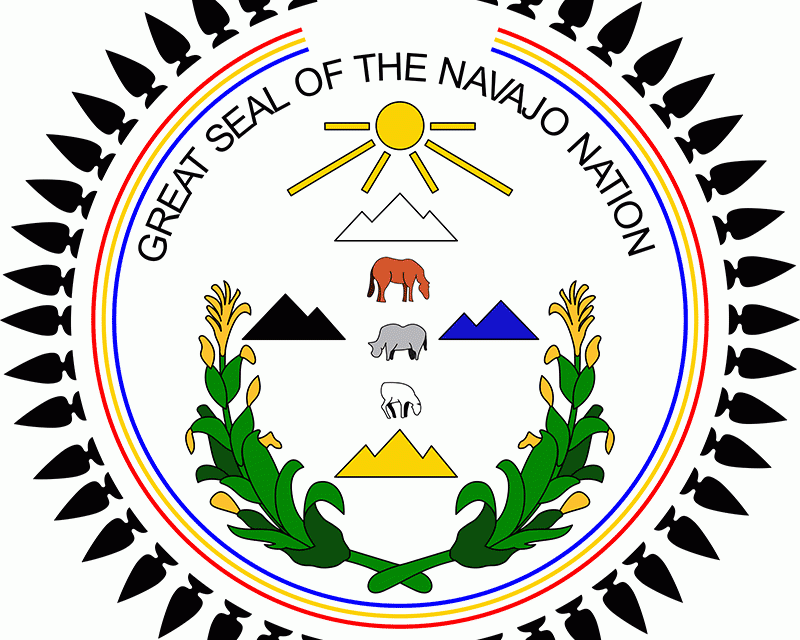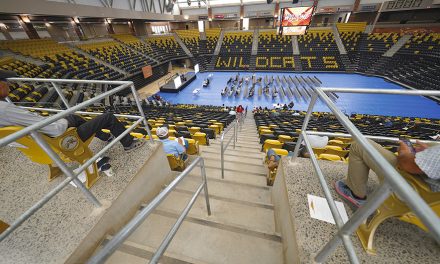
Letters: Nation should abolish NHA, DODE and NTUA

As a registered member of the Navajo Nation, self-proclaimed as the largest tribe (300,000-plus), recognized by the federal government. What government? A sovereign nation? Please.
We have politicians running for office who can’t clear a background check, who don’t hold an educational degree, or can’t answer a questionnaire, but only pay and fill out an application.
Any fool can do that. The election office should mandate a test, not an application. Our nation should cut Navajo Housing Authority, Division of Diné Education and Navajo Tribal Utility Authority. Why? NHA is a joke. Abandoned boarded-up houses. They have abused, lost, stolen how much money? They hire subcontractors and sit and watch them work. DODE, why? As the largest staffed program, when is the last time any school has made AYP? Enforced No Child Left Behind Act? Increased enrollment? Educated our children and not just pushed them through the system?
Why can’t we as Navajos offer free housing to police officers? Our law enforcement is overworked, underpaid and not recognized. Build a military and support our officers.
Who do you call when you need help when we have five officers? If you have the police department helping a domestic situation and a passenger on the side of the road dying, what is the officer supposed to do? When a cop responds to a call they are a judge, medical person, and counselor. How much can a human take?
Any medical staff, our veterans, elders, or any of our people who have a special need. Drive by and look at all the empty, broken-down, boarded-up houses. Our educators, which school board members are mandated by NCLB to hire highly educated instructors or lose their funding, when we can’t offer a house or a corner market to buy necessities. It’s just a thought.
Patricia Nezzie
Winslow, Ariz.
Navajo Nation president? None of the above
The election of a Navajo Nation president and vice president in 2018 should be about honest leadership, which virtually is non-existent at this time. It should also be about who can the Navajo people trust to stop the runaway corruption and scandals in the Navajo Nation government, and to restore therein credibility and confidence?
Instead, we see a past president with a history of corruption under his belt. I refer to ONSAT, BCDS Manufacturing, egg factory at Nageezi, and others, which were investigated and in which the same past president was implicated, and the investigation records were sealed from the public. He later publicly admitted (at the Shiprock political forum held on Aug. 6, 2018) to the loss of millions of dollars belonging to the Navajo people under his administration, to which he unequivocally stated he “could not do anything about it.” This is not leadership! We are also seeing a candidate who is an incumbent vice president of the Navajo Nation. He separated from his partner president and became his opponent in the 2018 election.
This candidate has not demonstrated achievement results as a vice president, instead, is viewed as a jogger, a follower, who once publicly claimed to be “surprised” by a recent attempted purchase of the failing Remington Company by the Navajo Nation for $525 million. Further, he did not take immediate action against the president’s daughter (whom he supposedly supervised) who was arrested for DUI after wrecking a Navajo Nation vehicle on April 22, 2018.
For over two years since the last major flooding of the Salt Creek at Shiprock, that almost claimed the lives of Navajo families at night, he failed to deliver on his promises to help alleviate the very dangerous flooding problem. This is not leadership! Suffice it to say, the foregoing irresponsible actions and inactions negate any suggestions that either candidate could provide the needed honest leadership for the Navajo people. Having said that, it is abundantly clear that the subsequent strategies of both candidates were to immediately cover up their inadequacies or imperfections.
A mad rush immediately ensued to put up a smoke screen by securing vice presidential candidates who might interest the voters — a distraction ploy. One of the presidential candidates picked an outstanding candidate, who discovered he was not a voter and thus, withdrew. Subsequently, a young individual became the substitute.
He and his spouse apparently were continuing their education. The substitute apparently has no appreciable experience in Navajo, state, or federal governmental affairs. The other presidential candidate picked a hardware store manager who, obviously, is also without any appreciable experience in Navajo, state, or federal governmental affairs.
Clearly, we as Navajo voters, ought to vote for a president — an honest nataani, who will strongly represent our interests as a nation, honesty to restore integrity and credibility to the Navajo Nation, and strength to deal with the unpredictable state and federal governments.
Instead, the two presidential candidates would have us believe that our votes should be premised on which is the most interesting or popular vice-presidential candidate. Most interestingly, neither candidate nor their running mates have pledged to the Navajo voters, specifically, how and when they will stop the tragic corruption and scandals that has become all too pervasive in our Navajo Nation government.
Ironically, both candidates are shouting, “Let’s work together” as a campaign theme. The idea of “working together” obviously did not happen in the past for the two current presidential candidates, as Shirley/Shelly split as did Begaye/Nez. Needless to say, as Navajo people, let us not be gullible to campaign rhetoric and promises, or be easily swayed by the current hue and cry of who has the most interesting vice presidential candidate.
It will take a sincere and honest individual to provide the needed presidential leadership for the Navajo people at this critical time. Unfortunately, at this juncture, in this race, I see no one qualified to lead as president of the Navajo Nation with honesty, integrity and strength.
Samuel Pete
Shiprock, N.M.
Some recommendations for dealing with veterans
Last year, right around this time, I submitted an article to Navajo Times for whatever it was worth. It is not that I don’t have any faith in its weekly publications. I enjoy reading about certain articles that have meaningful substance. I am just overly concerned what happens to all the different thoughts expressed in these publications.
In reality, are tribal politicians receptive to these concerns? For instance, I am a Vietnam combat veteran and served during the vicious Tet Offensive during 1968-69. This gives me the right to express my conscience.
Last year, I gave recommendations that would significantly improve service delivery to our Diné veterans population. It appears nothing has transpired relative to these recommendations. Now, the election primaries are over and the general elections are forthcoming. In theory, some of the candidates had good ideas, but in practice the threshold for viable opportunities are absent. The recommendations I offered were in line with the threshold, a point of beginning to address veteran issues.
The Diné Nation has to start somewhere. This threshold should be relevant, unbiased, culturally tailored, and take into consideration the unique needs of Diné veterans. We don’t live in the big mainstream cities. Therefore, the U.S. congressionally mandated Title 38 USC “Veteran’s Benefits” booklet doesn’t necessarily resonate with local Diné-based issues. Only one candidate came closest to this proposed threshold relative to a comprehensive demographic study. I would like to see a comprehensive Diné veterans benefits booklet that will entail what veterans have been attempting to voice throughout all these years.
If I may, and with all due respect, I wish to provide those same recommendations in the form of ideas:
1.) Collective veterans’ accountability standard or track record is absent;
2.) No fair and equitable cost-of-living adjustments for those receiving disability, compensation, and pension benefits;
3.) No realistic veterans’ health care cost containment strategies, includes co-pays and affordable insurance updates;
4.) No sound regional socio-economic recourse, projections, and updates;
5.) No realistic and creative/innovative Diné-based on-the-job training opportunities;
6.) No culturally-tailored rehabilitation centers;
7.) No unified and collective “one-voice” effective veterans organizations to voice, monitor, and solidify critical issues;
8.) No viable partnerships with neighboring colleges and universities to enroll Diné veterans who want to take advantage of educational and training opportunities like the Veterans Upward Bound and similar programs;
9.) No legal recourse and advocacy assistance for incarcerated Diné veterans; and
10.) No effective strategic plan and mechanisms to hold specially designed veterans’ forums, stand-downs, symposium, colloquia — an academic specialists meeting to address topics of veteran issues and their unique needs – meaningful annual conferences, summits, and town house meetings, etc., to name but a few viable options, alternatives, and opportunities.
Essentially, what this means is that so long as there is no strategic framework in place to address or redress complicated veterans’ issues, the local meetings and difficult sought-after requested meetings with tribal officials will remain nil, and nothing doing. The tribal office doors will remain closed.
Tribal politicians, please, stop treating Diné veterans with the typical bureaucratic runaround of “come back tomorrow.” Do you realize how far some veterans have to travel just to get into Window Rock — only to be told, “Sorry, he/she is on leave/training, late lunch, or in a do-not-disturb meeting,” etc.? Diné veterans deserve better.
Don’t just give impulsive political rhetoric or lip service during an election year or during the tribal “political-oriented” fairs. That is not going to make the cut and you will lose the sacred trust coming from Diné veterans. In the interim, the hard work and challenges begin in tribal politics.
Anthony Lee Sr.
Lukachukai, Ariz.
Horticulture exhibit was great success
Navajo Agricultural Products Industry had the honor of coordinating the Horticulture Exhibit at the 72nd Navajo Nation Fair on Sept. 4-9. With over 350 exhibitors, the event proved to be a success.
NAPI appreciated the interest from local farmers and was amazed by their skills with growing their crops. The Horticulture Exhibit had four primary categories: Field Crop, Vegetable, Melon, and Fruit. The showcase included entries such as: peaches, okra, eggplant, hubbard squash, jalapeños, beets, sunflower, mint, and basil — only to name a few. The NAPI staff recognized the thoughtful care provided by the local farmers, with the stories they shared and the patient handling of their entry.
NAPI would like to recognize the individuals who placed first, second and third, and received a ribbon with a monetary prize: Alice Benally, Amelia Rivera, Andrew Johnson, Annie Parker, Ashton Apachee, Atsa-Bah Martin, Aurelia Rivera, Bobby Martin, Cassidy Garcia, Christianna Henio, Claudia Gleason, Cole Andrew Jensen, Diné College, Felix A. Earle, Ganado FFA, Gerald Moore, Gunner Arviso, Harli Garcia, Helen Benally, Irene Notah, Jace Begay, Jeremy Gleason, Jethro Christiansen, Julian Apachee, Kassidy Garcia, Ken Garcia, Kimora Nez, Kody Garcia, Kristy Garcia, Leilou Help-Tulley, Loretta Worther, Margaret Johnson, Marlene Henry, NTU, Rita Roanhorse, Robert Garcia, Roxie June, Shawna Jean Perry, Sonlatsa Martin, and Vernita Reymus. The exhibitors undoubtedly defined NAPI’s vision of farming sustainably across generations to cultivate a healthy nation.
Ahéhee!
Darryl Multine
Interim Chief Executive Officer
Navajo Agricultural Products Industry
Farmington, N.M.
To read the full article, pick up your copy of the Navajo Times at your nearest newsstand Thursday mornings!
Are you a digital subscriber? Read the most recent three weeks of stories by logging in to your online account.







 Highway 264,
Highway 264, I-40, WB @ Winslow
I-40, WB @ Winslow